Topic: School finance lawsuits
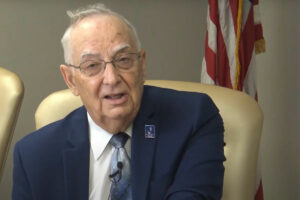
Interview of Dale Dennis, August 28, 2020
Interviewed by Andy Tompkins
People interested in the development of education policy in Kansas will find no better resource than this 2020 oral history interview with Dale Dennis, Deputy Commissioner of Education. The interview was conducted by Dr. Andy Tompkins, a former Kansas Commissioner of Education. During the interview, Dennis speaks candidly about policy development, identifying the issues and the legislators who were intrinsically involved. The interview covers the 1972 lawsuit which was the first dealing with issues of equity in school funding. Twenty years later, a 1992 school finance lawsuit again challenged the lack of equalization which rendered the formula unconstitutional. Dennis explains Show Morein detail the process by which the Legislature, Governor Joan Finney, Speaker Marvin Barkis, and others went about addressing the Court's concerns. By 2000 the Legislature had again failed to fund the school finance formula fully and the Montoy lawsuit arose. Another case, Gannon, began in 2010. This time the problem was the adequacy of the funding to meet constitutional requirements. Moving on from school finance lawsuits, the interview covers school consolidation and related issues of local control. Dennis explains why he started offering budget workshops to school administrators, including the development of software and the use of computers. This interview includes a brief discussion of the 1999-2000 legislation that moved state oversight of community colleges and technical schools (later termed technical colleges) from the Kansas Department of Education to the Kansas Board of Regents. Show Less
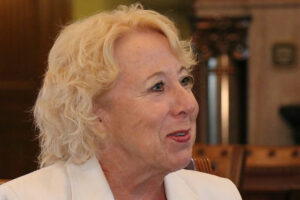
Interview of Christine Downey, August 2, 2019
Interviewed by Dale Goter
Former State Senator Christine Downey recalls her three terms in the Kansas Senate (1993-2004) during her 2019 oral history interview. With her background as a teacher, education issues were important to her as the era of school-funding litigation continued. She was involved in water-related policy making, in particular at the nexus of water quality and agricultural practices. She recalls her service in the Senate and on the Kansas Board of Regents first developing the policy and then implementing fundamental changes to the postsecondary education system. Ms. Downey discusses numerous instances of working across the aisle Show Moreto accomplish policy objectives that did not break on strict party lines. Show Less
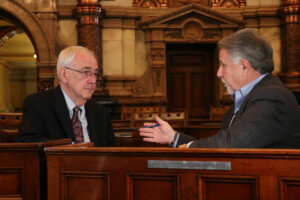
Interview of Tim Emert, October 4, 2019
Interviewed by Jim McLean
Tim Emert's interview covers his Senate career in the last decade of the Twentieth century, following passage of a markedly different school finance bill in 1992 and with a divided Republican caucus in the Senate--a time of big change. Emert stepped into the chairmanship of the Senate Judiciary committee immediately and later moved up to Majority Leader by a one-vote margin. The interview is filled with descriptions of coalitions he formed to get legislation passed. As Judiciary chair Emert dealt with both the death penalty, which he personally opposed, and a bill restricting late term abortions which Show Moreno one liked but passed. He worked with Christine Downey to get a major policy change regarding community colleges. There are also descriptions of his work on the State Board of Education and later, the Board of Regents. Emert describes himself as neither moderate or conservative, but "a realistic Republican." As Majority Leader he talks about the "juggling act" trying to keep communication with the conservative House Speakers (Shallenburger and Jennison) and the Senate. He explains the tension in having both the poorest and richest counties in his district and trying to provide equalization of school funding. The interview touches on the renovation of the Capitol and also renovation of Cedar Crest. Show Less
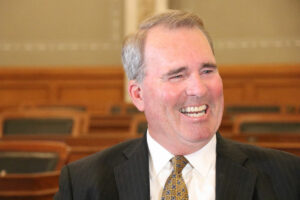
Interview of Robin Jennison, October 4, 2019
Interviewed by Jim McLean
Jim McLean’s interview of Robin Jennison is lengthy but full of interesting stories and anecdotes about what went on in the legislature in the last decade of the 20th Century. McLean teases out both the politics and policy from Jennison’s experiences in the House with the 1992 school finance bill and his Republican alternative. Jennison shares his philosophy on how to fund schools, lower property taxes, leadership races and his rapid rise to Speaker in the 1999-2000 sessions. The strategy he used to pass the 1999 transportation bill out of the House is clever. There is Show Morean anecdote about replacing carpet in the Judicial Center and what it took to get that appropriation passed. Jennison describes his role as Secretary of Wildlife and Parks and working under Governor Brownback. Show Less
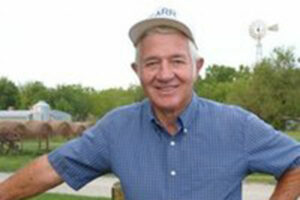
Interview of Gerald (Jerry) Karr, May 11, 2017
Interviewed by Janice Huston
This interview of Senator Jerry Karr by Janice Huston for the Lyon County Historical Society is lengthy, but gives great insight into the 18 years Karr spent in the Kansas Senate. It also covers his academic career which preceded his election and delves into rural life in Kansas. It begins with his Sierra Leone experiences teaching agricultural economics and other teaching jobs in the Midwest. Karr was elected to the state Senate in 1980 which is the time the farm crisis started boiling over in Kansas. During those first 10 years he developed legislation addressing Show Morethe farm crisis, including changing the method of selecting the Secretary of Agriculture, altering the classification and reappraisal of land, and regulating corporate hog farming. His service on the Joint Rules and Regulations Administrative committee helped him shape agricultural policy. He became Minority Leader ten years after his first election. Redistricting in 1991 ended up in the courts and spelled the end of many rural Democrats. There are numerous examples of policy making, particularly the details about the 1992 school finance legislation that amplify others’ accounts of that legislation. His examples of effective leadership and effective campaigning will be of interest to many. The interview also covers communication with constituents in a large district and has anecdotes about issues leaders have to deal with. Karr covers just about all aspects of leading a caucus and life in the Senate in the 1980s and 1990s. Show Less

Interview of Fred Kerr, March 30, 2015
Interviewed by Burdett Loomis
This is the first of two oral history interviews of Fred Kerr in this collection. (Ed Flentje conducted the second interview 2018.) Kerr reflects on his 15 years in the Kansas Senate representing the 33rd Senate district. He recalls Senate leaders and fellow Senators who helped him as a freshman and the influence of those mentors on his career. Fred talks extensively about the process involved in securing a leadership position in the Senate and the dynamics of leadership races. He also reflects on the urban-rural divide in Kansas politics that during the late Show More1970s and early to mid 1980s was often more of a force than the partisan divide. A version of this interview is also posted on KansasMemory.org, the website of the Kansas Historical Society. A more recent oral history interview of Fred Kerr is here. Show Less
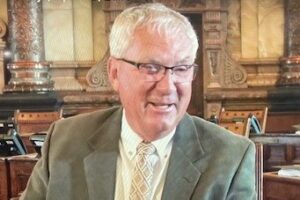
Interview of Fred Kerr, April 13, 2018
Interviewed by H. Edward (Ed) Flentje
Fred Kerr reflects on his 15 years in the Kansas Senate representing the 33rd Senate district. He recalls Senate leaders and fellow Senators who helped him as a freshman and whose influence guided him throughout his career. Fred talks about the process involved in securing a leadership position in the Senate and the dynamics of leadership races. He observes how relationships between competitors for leadership offices affected Senators differently and how they worked together in subsequent legislative sessions. He also reflects on how decisions were made regarding tax policy both to fund highways and public schools. Show MoreFred, who ran for Governor in 1994, comments about the increasing influence of money and monied interests in state-wide politics. A previous oral history interview of Fred Kerr is here. Show Less
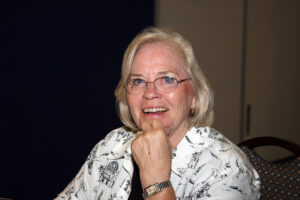
Interview of Janis Lee, October 14, 2019
Interviewed by Joan Wagnon
Former State Senator Janis Lee's 2019 oral history interview covered her 22 years in the Kansas Senate as well as several years on the Kansas Court of Tax Appeals (formerly the Board of Tax Appeals and later returned to that name). The interview covers many topics, including how she campaigned in a rural district that increased in area over those 22 years, driving as much as 45,000 miles in an election year. Lee developed expertise in tax issues that was important to the agriculture community and in funding rural schools. Water supply was an important issue in her district, Show Moreas was adapting federal regulations so they would work in rural communities. She witnessed the shift to a more conservative legislature and more anti-abortion legislation. Funding for schools dominated most sessions.
Highlight -- short excerpt from the interview
Show Less
Interview of Doug Mays, September 25, 2020
Interviewed by Alan Conroy
This interview with former Speaker Doug Mays contains good insight into how the Kansas House of Representatives functioned at the end of the Twentieth Century and the first decade of the Twenty-First. The institution was changing as its membership became more conservative. Mays describes in great detail how its leadership dealt with controversial issues such as school finance and taxation. Mays cites two issues as his proudest accomplishments: passing a sales tax to lower property taxes for Washburn University and neighborhood revitalization legislation. Speaker Mays notes that every time a bill came through, he read Show Moreit. His discussion of the power of the speaker is illustrated with numerous examples. “ I believed in the process. I believed that the speaker was the keeper, the protector of the process.” He promoted civility in the body and developed a good relationship with the Minority Leader Dennis McKinney which allowed him to end the 2005 Special Session without adjourning sine die. Mays promoted greater use of technology for the legislature and tightening of deadlines to ensure smooth operations. There are several examples of his relationship with governors. Anyone interested in being a speaker should read this interview. Show Less
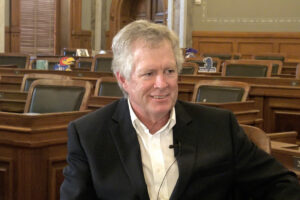
Interview of Dennis McKinney, August 23, 2019
Interviewed by Dale Goter
Dennis McKinney developed many insights in his sixteen years as a leader in the minority party into how the legislature did work, and how it should work. He recounts numerous instances when things worked well because of bipartisan cooperation and compromise. McKinney's experiences on the House Energy and Natural Resources committee working with Carl Holmes and Ken Grotewiel helped shape water policy in Kansas. His experience as a farmer and rancher in south central Kansas coupled with his focus on problem solving led to his reputation as a "middle of the road legislator" who would work Show Morewith both political sides as well as urban and rural. McKinney was committed to public education as well as conservation. The pursuit of fair and balanced tax policy shaped his actions. The interview highlights the importance of leadership from the governor's office and other legislative leaders (Mays, Shallenburger, D. Kerr, Morris). There is an interesting segment about the 2005 Special Session on school finance where McKinney talks about using the courts as leverage. The interview concludes with a brief discussion of the Greensburg tornado. Show Less
